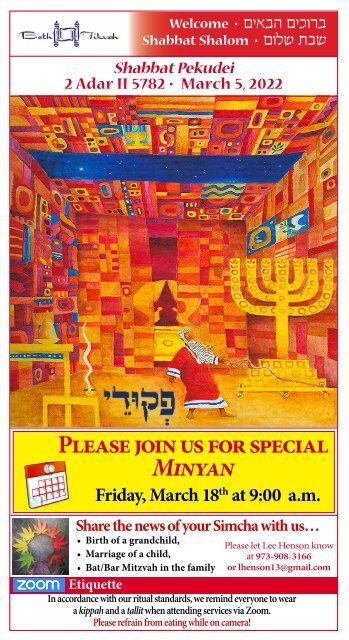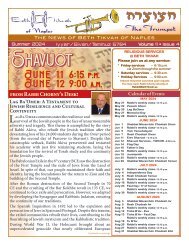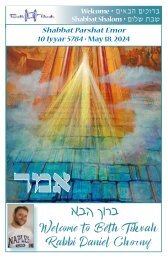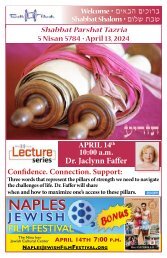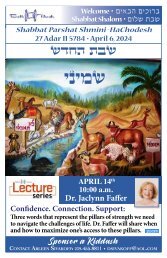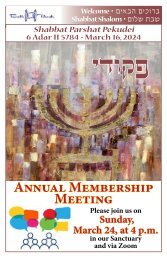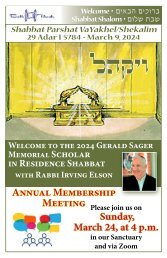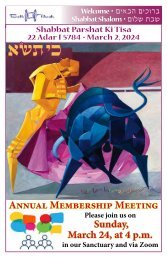You also want an ePaper? Increase the reach of your titles
YUMPU automatically turns print PDFs into web optimized ePapers that Google loves.
Welcome • ohtcv ohfurc<br />
Shabbat Shalom • ouka ,ca<br />
Shabbat Pekudei<br />
2 Adar II 5782 • March 5, 2022<br />
Please join us for special<br />
Minyan<br />
Friday, March 18 th at 9:00 a.m.<br />
ZOOM Etiquette<br />
Share the news of your Simcha with us…<br />
• Birth of a grandchild,<br />
• Marriage of a child,<br />
• Bat/Bar Mitzvah in the family<br />
Please let Lee Henson know<br />
at 973-908-3166<br />
or lhenson13@gmail.com<br />
In accordance with our ritual standards, we remind everyone to wear<br />
a kippah and a tallit when attending services via Zoom.<br />
Please refrain from eating while on camera!
Yahrtzeiten<br />
Mar 4 • II Adar 1 Judy Rosenthal – Wife of Harvey Rosenthal<br />
Leonard Weiss – Father of Sue Brown<br />
Joseph Kappel – Father of Roberta Miller<br />
Birthdays<br />
Mar 6<br />
Mar 7<br />
Mar 8<br />
Mar 10<br />
Mar 11<br />
Gabriel Castro<br />
Angel Alfaro<br />
Rosalee Bogo, Arlene Levin<br />
Shelley Goodman, Herbert Wreschner<br />
Ruth Bier<br />
Anniversaries<br />
Mar 4 JoAnne & Barrett Burka (55)<br />
Kiddush Sponsors<br />
vfrck oburfz<br />
jna ,skuv ouh<br />
cuy kzn<br />
Larry & Evelyn Hecht,<br />
In honor of Evelyn’s Birthday!<br />
Danielle Ciccoli,<br />
In honor of her daughter Zara’s first Birthday!<br />
Jerry & Rosalee Bogo,<br />
In honor of Rosalee’s Special Birthday!<br />
Arlene Levin,<br />
In honor of her Birthday!<br />
Howard & Esther Starkman,<br />
In honor of our children, who usually favor the<br />
east coast of Florida!<br />
Kiddush Maven Elaine Kamin assisted by Beverly Blazar,<br />
Rosalee Bogo, Nancy Garfinkel, Sharon Goldman,<br />
Sue Hammerman, Evelyn & Larry Hecht, Fred Kamin, Arlene Levin,<br />
Linda & Shep Scheinberg, Arleen & Dave Sivakoff<br />
To sponsor a kiddush, please contact Linda Scheinberg<br />
missus205@gmail.com<br />
Tickets for the Virtual Film Festival are<br />
available now!<br />
To make your purchases, please use use the<br />
following link to access our ticket booth:<br />
https://tinyurl.com/2p92hm6j
Torah & Haftarah Readings:<br />
Shabbat Pekudei: Exodus 39:22 (Etz Hayim p. 567)<br />
1. 39:22-26 2. 39:27-32 3. 39:33-43 4. 40:1-8<br />
5. 40:9-16 6. 40:17-27 7. 40:28-38 M. 40:34-38 (p. 571)<br />
D'var Torah:<br />
Haftarah: I Kings 7:51-8:21 (Etz Hayim p. 574)<br />
Torah / Haftarah Summary<br />
In God's Shadow - Ilana Kurshan<br />
Parshat Pekudei describes the construction of the Mishkan and its<br />
furnishings in accordance with the specific instructions given by God<br />
to Moshe. The chief artisan responsible for the project is Bezalel, who is<br />
described as being “filled with the Spirit of God, with wisdom,<br />
with understanding, with knowledge and all kinds of skills”<br />
(Ex. 31:3). The account in our parshah suggests that Moshe and Bezalel<br />
worked side by side, with Moshe receiving the architectural specifications<br />
from God and Bezalel implementing them. But the Talmud tells a more<br />
nuanced story about the nature of their collaboration, suggesting ways in<br />
which we can work constructively with one another.<br />
The Talmud (Berakhot 55a), in discussing Bezalel’s unique talents, highlights<br />
a discrepancy between God’s instructions for building the Mishkan as<br />
conveyed to Moshe, and the Torah’s account of its actual construction.<br />
Moshe, in transmitting God’s instructions, speaks first of the construction<br />
of the ark, along with its golden cover and golden cherubim (see chapter<br />
25). Only then are we told about the construction of the Mishkan itself,<br />
with its cloth coverings and planks of acacia wood (ch. 26). But when the<br />
instructions are actually carried out, the Torah states that Bezalel made<br />
the tents and planks (ch. 36) and only then built the ark and its accessories<br />
(ch. 37). If God’s instructions to Moshe specified building first the ark and<br />
then the Mishkan structure, why did Bezalel reverse the order?<br />
The rabbis recount a conversation between Moshe and Bezalel about this<br />
discrepancy. According to the rabbis, God told Moshe to instruct Bezalel<br />
to build the Mishkan and then the ark inside it. But Moshe—perhaps<br />
inadvertently—switched the order and told Bezalel to build the ark and<br />
then the Mishkan to house it. When Bezalel heard Moshe’s instructions,<br />
he was puzzled, as they seemed inconsistent with his own experience and<br />
expertise as an artisan. And so, he questioned Moshe about what he’d<br />
been told: “Moshe our teacher,” he began politely and deferentially, “The<br />
standard practice throughout the world is that a person builds a house<br />
and only afterward places the vessels inside it. And yet you said to me:<br />
Make an ark and vessels and a Mishkan. If I do so in the order that you<br />
commanded, where would I put the [ark and] vessels?” It seemed unlikely
to Bezalel that God would want him first to build the ark, and only then<br />
build a Mishkan. Boldly but respectfully, Bezalel went on to ask Moshe,<br />
“Perhaps God rather told you to make the Mishkan, then the ark?”<br />
We can imagine a moment of silence in which Moshe tried to recall<br />
exactly what God had told him up on Mount Sinai, amidst the thunder<br />
and lightning of revelation. And then suddenly Moshe remembered that<br />
indeed Bezalel was right – God had indeed told him to build first the<br />
Mishkan and then the ark, as Bezalel had supposed. How could Bezalel<br />
have known? The Talmud records Moshe’s response: “Perhaps you were<br />
in God’s shadow, and you knew precisely what God said?” The Hebrew<br />
word for “in God’s shadow” are “Be-Tzel El,” and thus this Talmudic<br />
account also serves as a midrashic explanation for Bezalel’s name. Bezalel<br />
was so wise that he could intuit God’s instructions to Moshe even without<br />
hearing them directly, as if he were all along standing in the shadow of<br />
God’s presence.<br />
It is telling that Moshe assumes that the ark should be built first, whereas<br />
Bezalel reasons that the Mishkan takes primacy. As Rabbi Yehuda Brandes<br />
explains (in Torat Imecha, Maggid, 2008, untranslated), Moshe lists the ark first<br />
because the ark is of central religious importance – it is here that God’s<br />
presence will be revealed, and it is here that God will speak to the people<br />
from between the golden cherubs. The ark, too, is the house for the Ten<br />
Commandments containing God’s holy word as spoken to Moshe on Sinai.<br />
Surely the ark should be built first, followed by the Menorah and altar and<br />
the other vessels used in the worship of God. And surely the tent coverings<br />
and curtains of the Mishkan should come last since they are merely the<br />
enclosure for the holy items inside. For Moshe, a visionary leader who<br />
speaks face-to-face with God, it is clear that the most sacred items take<br />
primacy. But for Bezalel, the expert craftsman, it is obvious that the holy<br />
vessels can’t exist without a place to house them, and thus he assumes that<br />
the Mishkan must be built prior to the ark and its furnishings.<br />
As we learn from Moshe and Bezalel, it takes all kinds of talent to build a<br />
home for God. I think about this lesson nearly every Shabbat afternoon,<br />
when my kids embark on an elaborate construction project involving<br />
blocks, cushions, chairs, kitchen utensils, bed sheets, and stuffed animals.<br />
One week they build a synagogue, the next week a swimming pool, the<br />
next week a sushi shop. Usually, it is my daughter who conceives of the<br />
idea, and my son who directs the construction. “Let’s make the sushi free<br />
for homeless people,” says my daughter, and my son responds, “we’ll give<br />
them xylophone sticks for chopsticks.” They don’t always see eye to eye, but<br />
in those moments when they are able to appreciate one another’s talents<br />
and contributions, I sometimes imagine that I’m catching a glimpse of the<br />
indwelling of God’s presence behind the Fisher Price cash register.
D'var Haftorah<br />
The Builder of the Dwelling - Bex Stern Rosenblatt<br />
In the beginning, God created the world, a habitation and home for<br />
humanity. However, creation was not complete until this week’s parsha in<br />
which humanity built a home, the mishkan, for God. But there was still<br />
something missing. The mishkan was a traveling home. Just as we see in<br />
God’s punishment to Cain, God was set to be a restless wanderer with us.<br />
It is not until this week’s haftarah, many hundreds of years later, that God<br />
allows us to build a true home for God. The Temple is built, and creation is<br />
complete.<br />
Solomon, whose very name comes from Shalom, completeness, is the one<br />
chosen to complete creation. After he does, by building the Temple, God<br />
comes to dwell in it. Solomon announces this completion with a beautiful<br />
verse. As Robert Alter translates, Solomon says, “I indeed have built<br />
You a lofty house, a firm place for Your dwelling forever.”<br />
The idea of building God a dwelling place is bold. Humans become real<br />
partners for God in creation, in God’s image, we create for God. Solomon<br />
celebrates this, starting his declaration by talking about himself. He names<br />
himself as the builder of the dwelling, putting himself in direct relationship<br />
with God, not as a representative of all the builders or of all the Israelites or<br />
even of humanity, but rather as Solomon the individual.<br />
The thing that Solomon says he has built is, (as Alter translates), “a lofty<br />
house.” The word translated as lofty is zevul, which appears in only six other<br />
places in the Tanakh. Notably, it appears in Psalm 49, addressing the hubris<br />
of humanity in assuming that they can be like God. We read of humans,<br />
“their grave is their house forever, their dwelling place for all generations…<br />
Sheol is a habitation for them.” Here zevul is translated as habitation, which is<br />
located in the lowest place, totally cut off from God, in Sheol. Whereas God’s<br />
zevul is a lofty place, the zevul of humanity is death.<br />
But Solomon also calls it “a firm place for Your dwelling.” This is a throwback<br />
to the Song of the Sea, which Moses recited. Moses sang, (as Alter translates),<br />
“You’ll bring them, you’ll plant them, on the mount of Your estate, a firm<br />
place for Your dwelling You wrought, O LORD, the sanctum, O Sovereign,<br />
your hands firmly founded. The LORD shall be king for all time!” Here,<br />
God’s dwelling is equated with human dwelling. God is choosing to plant<br />
humans in the place in which HE dwells. Moses celebrates that God will be<br />
the one who causes the Temple to be built, who makes Jerusalem our forever<br />
home. Solomon’s use of the phrasing of Moses helps us to understand how<br />
humans, whose dwelling place is death, could possibly make a dwelling place<br />
for the God who gave us life. It is through our agency as creations of God that<br />
we are able to create for God. When Moses and Solomon understand this,<br />
they are able to bring completeness to creation.
Rosh Chodesh Women's Study Group<br />
Adar II<br />
Sunday March 6 th<br />
10:00 a.m. EST<br />
Facilitator:<br />
Odette Masliyah<br />
Odette will introduce<br />
Esther Amini's author of<br />
"Concealed"<br />
The memoir as a Jewish-Iranian daughter<br />
Caught between the Chador and America.<br />
Esther Amini's memoir is a provocative coming-of-age saga,<br />
recounting her youth and early adulthood as a firstgeneration<br />
Iranian American Jewish woman in<br />
the 1950s and '60s.- How do we fulfill our mission<br />
statement to be an inclusive community<br />
This special event is open to ALL regardless of gender!<br />
Please join us via<br />
3/16/2022<br />
Purim is Coming!<br />
March 16 th at 6:00 p.m.<br />
Please join us for a "live" fun-filled<br />
Evening with food, merriment featuring the<br />
"Alta Rockers" & the Megilah Reading<br />
Beth Tikvah of Naples<br />
1459 Pine Ridge Road<br />
Naples, FL 34109<br />
(239) 434-1818<br />
Visit us online at<br />
bethtikvahnaples.org<br />
or scan the QR code<br />
to go there directly


